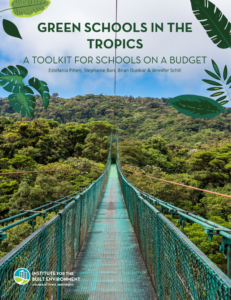The global recognition of the benefits of green schools at an operational, educational, environmental, and community level is growing and reaching more educators and school administrators. This is true in both developed and developing nations. Nevertheless, most of the resources to date have been oriented toward developed nations. This toolkit, led by IBE fellow Estefania Pihen, seeks to address the unique attributes and contexts of developing nations, specifically in tropical climates, and focuses on easy-to-replicate and affordable green practices aligned with the Whole School Sustainability Framework.
The examples and case studies presented in this toolkit are from a successful, low-funded private school in Costa Rica. These stories show that a green school can be created even in geographically remote schools with limited funding. We hope that this paper inspires more school administrators and teachers to implement Whole School Sustainability, integrating environmental and social literacy into enhanced academic programs.
Find the companion Whole School Sustainability Framework here.

